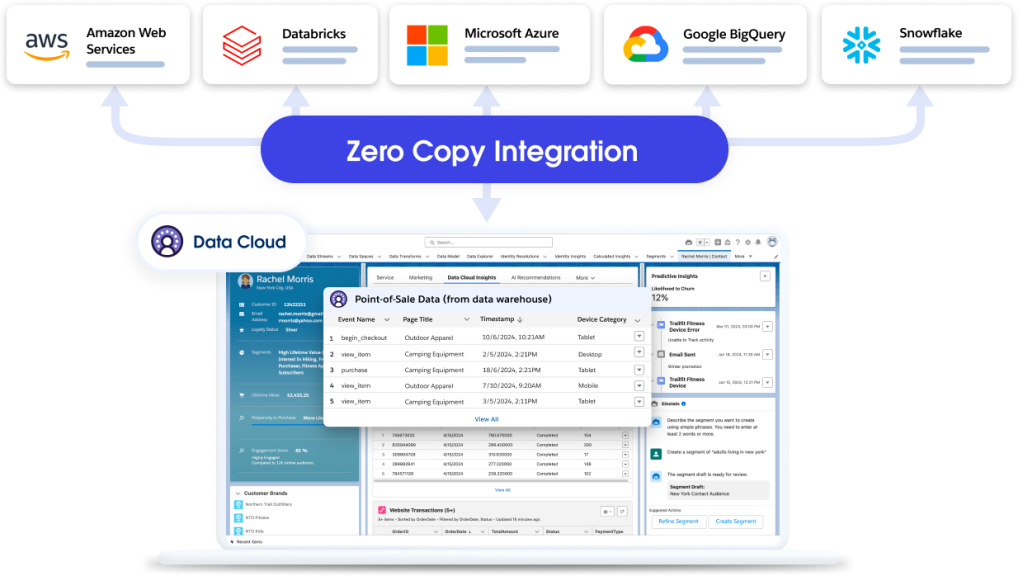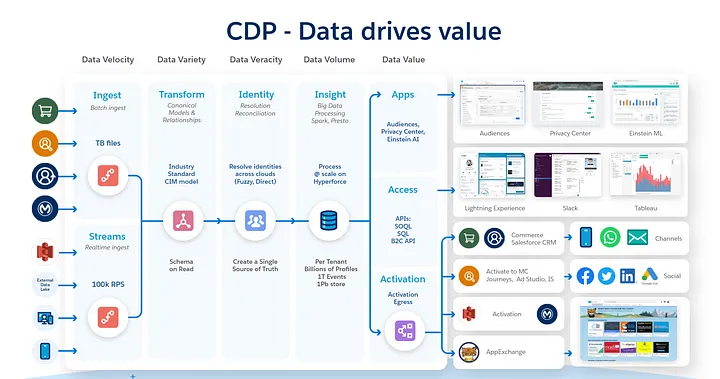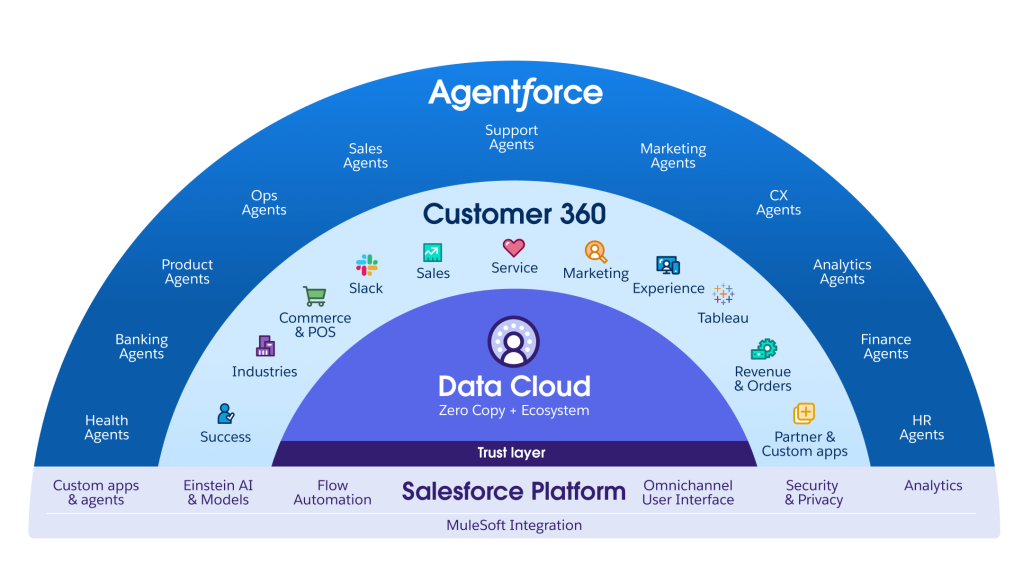
By Teqfocus Team
4th Nov, 2024
In today’s healthcare landscape, patient engagement has become a critical factor for success, driven by value-based care models and the growing expectation for personalized services. Technologies like Salesforce’s Data Cloud and Agentforce are at the forefront of this transformation, offering healthcare providers powerful tools to deliver more personalized, efficient, and proactive care.
Understanding the Importance of Patient Engagement
Effective patient engagement is essential to achieving better health outcomes and reducing costs. According to a study by McKinsey, healthcare systems that prioritize patient engagement can see up to a 20% reduction in hospital readmissions and a significant improvement in patient satisfaction scores. Here are some of the key drivers behind the focus on patient engagement;
- Value-Based Care: The transition from fee-for-service to value-based care means healthcare providers are now compensated based on patient outcomes rather than the number of services rendered. Engaging patients in their care journey is crucial to achieving better outcomes.
- Rising Consumer Expectations: Patients increasingly expect the same level of service and convenience they receive in other industries. This includes personalized communication, easy access to health information, and timely interventions.
- Chronic Disease Management: With chronic conditions on the rise, ongoing engagement is necessary for effective long-term management. Data Cloud and Agentforce enable personalized care plans that cater to each patient’s unique needs
- Regulatory Pressures: Regulatory frameworks like the Medicare Access and CHIP Reauthorization Act (MACRA) and the Merit-based Incentive Payment System (MIPS) emphasize patient engagement as a key performance metric.
Data Cloud: Creating a 360-Degree Patient View
Unifying Patient Data for Better Insights
One of the most powerful features of Salesforce’s Data Cloud is its ability to create a unified, 360-degree view of the patient. Data Cloud aggregates information from various sources, including Electronic Health Records (EHRs), IoT devices, patient portals, and other health data repositories, to provide a comprehensive profile of each patient.

Key Capabilities Include –
- Demographic Information: Age, gender, and social determinants of health (SDOH) that impact care delivery.
- Medical History: Comprehensive details on past diagnoses, treatments, and ongoing care plans.
- Cross-System Data Integration: Synchronizes data from multiple systems to ensure that providers have real-time access to the most relevant information.
According to Salesforce, organizations using Data Cloud have seen a 30% increase in patient data accuracy and a 25% reduction in data silos across departments, leading to more informed decision-making.
Real-Time Data Integration for Timely Interventions
Data Cloud’s real-time data integration capabilities are crucial in healthcare settings, where timely information can be life-saving. For instance, consider a patient with chronic heart failure using a connected device that detects a sudden weight gain – a sign of fluid retention. This data is immediately sent to Data Cloud, which updates the patient’s profile in real-time and alerts the healthcare provider, enabling prompt intervention and potentially avoiding a hospital readmission.

Technical Aspects –
- Streaming API: Allows the ingestion of real-time data from wearables and IoT devices.
- Event-Driven Architecture: Triggers actions based on changes in patient data, such as scheduling a follow-up or sending alerts.
- Change Data Capture (CDC): Ensures that updates are synced across systems instantaneously, maintaining data consistency.
Agentforce: AI-Driven Patient Engagement
Personalized Communication with AI-powered Insights
Agentforce, powered by Data Cloud, utilizes AI to deliver personalized patient communication at scale. By leveraging AI and machine learning, healthcare providers can create contextually relevant messages that resonate with each patient’s specific needs.

Example Use Case: Agentforce can automatically send a personalized care plan summary to a patient post-discharge, including medication reminders, upcoming appointments, and health tips tailored to their condition. This level of engagement significantly improves patient adherence to care plans and overall satisfaction.
Enhancing the Patient Portal Experience
Patient portals are evolving into intelligent self-service platforms, thanks to AI-driven capabilities provided by Agentforce. These portals offer features like:
- 24/7 AI Assistants: Virtual assistants that handle patient queries, appointment scheduling, and medication refills.
- Telehealth Integration: Seamless connectivity with telehealth services for virtual consultations.
- Personalized Health Insights: AI-generated health recommendations based on the patient’s data and care guidelines.
Studies have shown that personalized patient interactions can increase portal engagement rates by up to 40%, resulting in more proactive and informed healthcare consumers.
Case Study of Bluestone Medical Group
Let’s illustrate the practical implementation of Data Cloud and Agentforce using the Bluestone Medical Group (BMG).
- Unified Patient Profiles: BMG uses Data Cloud to consolidate data from multiple sources, creating a single view of each patient’s journey. This integration has led to a 15% increase in diagnostic accuracy and a 20% reduction in time spent on administrative tasks.
- Predictive Analytics for Proactive Care: By deploying AI models in Data Cloud, BMG can predict patient readmissions and intervene before complications arise. This proactive approach has reduced hospital readmissions by 18% among high-risk patients.
- AI-driven Communication: Agentforce’s AI capabilities enable BMG to automate routine interactions, saving clinicians valuable time while maintaining personalized patient engagement. This automation has resulted in a 30% increase in patient follow-up adherence.
The Strategic Business Impact
Beyond improving patient care, the integration of Data Cloud and Agentforce drives significant business value for healthcare organizations.
- Operational Efficiency: Automating routine processes and data-driven decision-making reduces operational costs, enabling staff to focus on high-value care activities.
- Scalability: Agentforce scales effortlessly as patient volumes grow, ensuring consistent service quality without the need for proportional staffing increases.
- Data-Driven Decision Making: The analytics capabilities of Data Cloud offer actionable insights that help optimize resource allocation, improve care strategies, and drive better financial outcomes.

Compliance and Data Governance
Implementing Data Cloud and Agentforce requires adherence to strict data privacy and security regulations. Healthcare providers must ensure compliance with;
- HIPAA: Enforcing robust data encryption and access controls to protect patient information.
- ONC Interoperability Standards: Supporting seamless data exchange through FHIR-based APIs.
- AI Ethics: Ensuring AI algorithms are transparent, unbiased, and explainable in line with emerging guidelines.
Conclusion
Salesforce’s Data Cloud and Agentforce are not just technological advancements; they are foundational tools that enable healthcare providers to transform patient engagement into a seamless, personalized experience. By harnessing real-time data, AI-driven insights, and scalable automation, these platforms address the core challenges of modern healthcare, including cost reduction, improved outcomes, and enhanced patient satisfaction.
As the healthcare industry continues its journey towards value-based care, early adoption of these technologies will set organizations apart as leaders in delivering data-driven, patient-centric care. Embracing these innovations now will ensure that providers are well-equipped to meet the evolving demands of the digital healthcare landscape.
